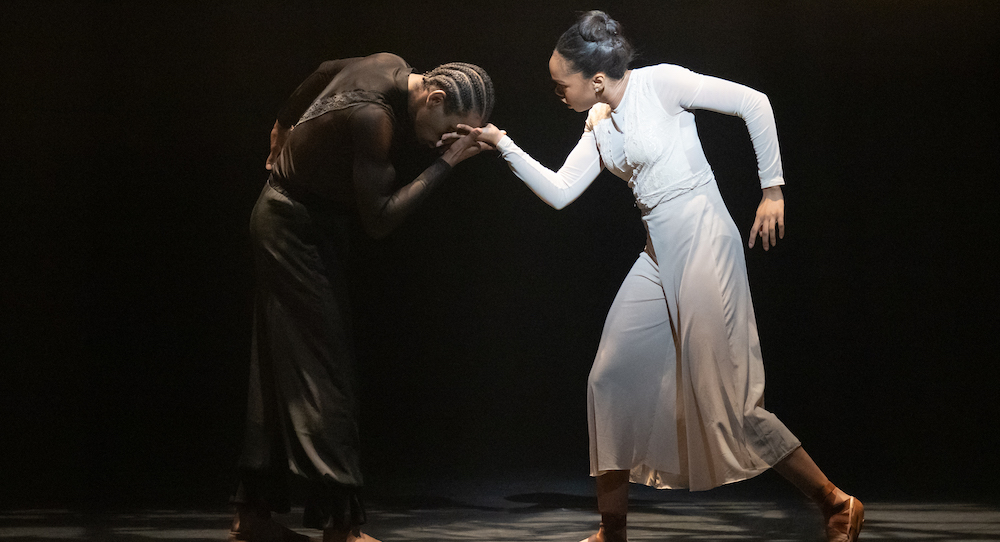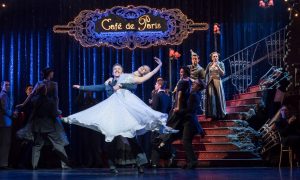Ballet Black will present a double bill of work at The Grange Festival this summer, featuring pieces by choreographers Chanel DaSilva and Sophie Laplane. Both pieces mark the choreographers’ festival debuts.
DaSilva’s work, which also marks her international debut, A Shadow Work, explores what it means to be human. Laplane’s piece, If At First, explores triumph over adversity and is inspired by the art of Jean-Michel Basquiat.
The Grange Festival runs from June 4-July 6, bringing together opera, classical music and dance. Here, Ballet Black founder Cassa Pancho and New York-based choreographer DaSilva share their excitement about the double bill and what audiences can expect.
On the festival, Pancho says, “This will be our second visit [first in 2019]. So, the first time, we were unprepared for how beautiful the grounds were and what the house and the theatre looked like. And now we have quite a few new dancers since last time. I’ve been trying to explain it to them without spoiling the surprise. But it’s such a wonderful atmosphere at The Grange Festival because I think for everybody there, it’s an investment. It’s an investment in your time and your money. So, I think you really, really want to be there. And you feel that as a performer. You feel that the audience are really, really keen to be there and to see what you’ve got to say and see what you’re going to perform. So, there’s something quite special about going to The Grange Festival, and we feel very welcomed by The Grange Festival, the people themselves, and the audience.”
Ballet Black’s performance takes place on July 3, at The Grange Festival, which is located in the Hampshire countryside in a Grade I-listed building.
On her work, DaSilva says, “The piece is titled A Shadow Work, and it is inspired quite literally by the psychoanalysis term ‘shadow work’. I did a little deep dive on this, and Carl Jung [Swiss psychiatrist and psychotherapist] believes that our shadow selves are sometimes the parts of ourselves that we push away, push down, or ignore because society has taught us that those are the unlovable sides of ourselves or those memories or experiences are too traumatic to deal with every day. Through my emotional therapeutic practices, I’ve come to embrace my shadow self and the experiences that have shaped me. So, when Cassa Pancho asked me to make a piece on Ballet Black, I was like, ‘So I’ve been kind of interested in this idea of shadow work and juxtaposing that with this idea of having an actual shadow following around.'”
DaSilva and Ballet Black’s pairing came via a DM sent on social media.
“With Chanel, I saw a clip of her work on Instagram, and I really loved it,” Pancho reveals. “I went and looked her up on YouTube and her website, and I watched everything I could. And then I sent her a direct message on Instagram saying, ‘Sorry to contact you this way, but I really like your work and I would love you to make something for my company.'”
After an exchange of messages, with Pancho joking “it took a little bit of persuading,” she managed to convince DaSilva to come to the UK for her first work here.
“I have to say the Ballet Black company are one of the most incredible companies I’ve ever worked with,” DaSilva shares. “They met me in this piece with their hearts and their bodies. You know, sometimes you meet dancers, and they meet you with their bodies, but they don’t want to insert their heart. Each and every one of Ballet Black’s dancers inserted their heart into this work, which is why I feel like the work really is palpable. It’s transformative and really leaves a lasting impact on the audience.”
Excited for her international debut, DaSilva adds, “Well, my piece, A Shadow Work, is my first international work. Yes, so I hold Ballet Black in my heart very dearly, and I’m appreciative to Cassa for giving me this opportunity. It feels wild because my younger self is like, ‘What is life right now? We have a work on stage in the UK. What is happening?'”
She continues, “It just feels really good to be valued, and have my voice valued. You know, I’m also going to name that, as a woman of colour in an art form that sometimes can feel quite homogeneous, to then be able to get to the place where I can say ‘I’m having an international premiere, and this work is on tour throughout the UK and is being performed at The Grange Festival.’ Like, that’s huge for me, a girl from East New York, Brooklyn, who, really, all I wanted to do was dance. And so, 30-something years later, to see my work premiere in the UK is a dream come true.”
Pancho echoes the sentiment. “It’s also exciting to be able to program an evening with two female choreographers, which doesn’t happen very often in ballet unless it’s a specific designated women’s choreographic thing. So, this is about excellent works, and they both happen to be by women because we have a lot of female choreographers in our repertoire. So that’s exciting for us as well.”
On the double bill, Pancho continues, “You know, Sophie and Chanel work very differently. Sophie has a very intense style where we would work in a very quiet setting all day, which requires a massive amount of focus, not just your physical, but also your mental skills. Chanel is much more talkative. And I think, you know, both ways are valid. Both rehearsal methods ended in a great ballet, but we got there differently. One method works a lot for some dancers, and another method works better for others. So, it was really good for the dancers to experience both because it just makes them more versatile as they go through their careers.”
The Grange Festival will run June 4-July 6. For more information, visit thegrangefestival.co.uk. For more on Ballet Black, head to balletblack.co.uk.
By Jamie Body of Dance Informa.












